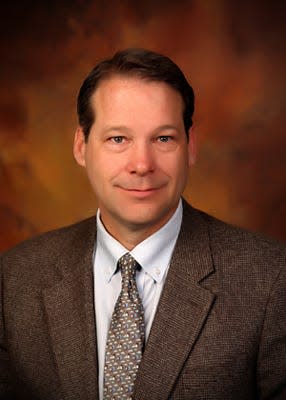Dr. John Bormes: With SD reeling from opioid epidemic, doctors need more options
- Oops!Something went wrong.Please try again later.

As the country works to end the COVID-19 pandemic, another public health crisis must be addressed with the same urgency: the opioid epidemic.
From Sturgis to Sioux Falls, opioid addiction and overdose have had devastating impacts on communities across the state. Though South Dakota was only one of two states where drug overdose deaths decreased last year, an epidemiologist at the South Dakota Department of Health told the state Opioid Abuse Advisory Committee in July that South Dakota ranks as a “top-three state in terms of opioid deaths per population.”
Because America’s opioid epidemic was fueled by the over-prescription of powerful painkillers over the past two decades, it is critical to give doctors the ability to help prevent addiction before it begins. To do so, federal government regulations must be amended so that physicians are better able to utilize nonaddictive alternatives to opioids.
While useful for some individuals in certain situations, opioid-based painkillers are not appropriate for every patient. Again and again, research has shown that narcotic-based pain relievers pose incredibly dangerous potential for dependence and abuse. Even when surgical procedures are minor versus major, dependence frequently occurs. Each year, more than 3 million Americans become hooked on prescription opioids after undergoing surgery, while the plethora of pills sitting in their medicine cabinets is ripe for diversion and abuse.
Adolescents and young adults are at particular risk – a 2021 study shows that parental use of prescription opioids is associated with adolescents using and misusing prescription opioids. And we’re finding significant disparities related to patient ethnicities and usage of pain medications. Tragically, Native American populations have some of the highest rates of opioid overdose deaths in the country.
For these and many other reasons, it’s critical that we remain vigilant about overprescribing dangerous opioids. Since opioids are inexpensive and readily covered by payers like Medicare for patients following surgery or injury, our political leaders must remove barriers to safe, effective alternatives. That’s why it is essential that we – health care providers, insurers and policymakers – identify how to improve our system of health care so that patients get appropriate pain relief without the inherent dangers associated with some painkillers.
Physicians like me would like the opportunity to choose the least harmful method of pain control for patients. Innovative, nonaddictive therapies — including a wide array of drugs and devices — do exist. But unfortunately, outdated Medicare policies mean that these treatments are often not covered appropriately and, therefore, are infrequently used. As long as Medicare fully covers the costs of opioids like fentanyl but hampers access to safe alternatives, South Dakota’s patients will be left with few options, other than narcotics.
With South Dakota providers writing 42.6 opioid prescriptions for every 100 people in 2018, it is time to rethink our over-reliance on opioid-based painkillers and expand access to non-opioid alternatives when clinically appropriate.
We are due for a change, and one is in the works in Congress. The bipartisan Non-Opioids Prevent Addiction in the Nation Act, House of Representatives Bill 3259/Senate Bill 586, commonly called NOPAIN, will give health care providers like me greater latitude in prescribing safer and non-habit-forming pain relievers after surgery. It is legislation that’s supported by thousands of physicians, addiction specialists, medical societies and other health care professionals because it would increase patient and provider access to non-opioid pain management therapies while helping to address the opioid epidemic by reducing the number of opioids flowing into our communities. Importantly, the NOPAIN Act does not, in any way, prevent physicians from prescribing opioids to patients who really need them – it just increases our options to include safer alternatives, if appropriate.
While celebrating our state’s efforts to address the opioid epidemic, I’m advocating for us all to do more to prevent addiction from taking root. Physicians are mindful of our patients’ post-surgical needs and will continue to prescribe the medications we feel are most appropriate. But it’s time for lawmakers to step up and join the fight by enacting legislation that supports our efforts to choose non-opioid treatments in situations where opioids aren’t needed.
I hope that Sen. John Thune and all members of our congressional delegation will join efforts to pass the NOPAIN Act to keep us on the right path in stopping preventable opioid abuse and deaths across South Dakota.
Dr. John Bormes has been practicing medicine in Aberdeen for the past 26 years.
This article originally appeared on Aberdeen News: South Dakota doctors need more options to combat opioid addiction
